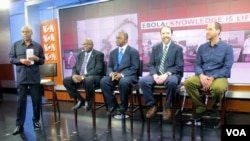Ending the current outbreak of Ebola in West Africa will require better regional coordination of resources, skills and supplies, along with timely diagnosis and treatment.
That’s the message of a town hall meeting on the disease, sponsored by Voice of America.
Several experts discussed the urgency in identifying and treating Ebola.
Dr. Malonga Miatudila helped identify the disease in 1976. Over the past 40 years, he said, there have been 25 outbreaks, none lasting more than three months. Dr. Miatudila said the failure by the public health community worldwide to quickly react to the crisis makes it more serious than the previous outbreaks.
“When it started in Guinea, we waited. We waited, we waited, we waited. We spent time. We waited more than 100 days before acknowledging we had a problem,” said Miatudila.
The World Health Organization said there has been a "steep increase" in the number of cases in Sierra Leone, including 421 new infections reported last week.
This week, the hardest hit West Africa country, Liberia, set a national goal of recording no new cases by Christmas, December 25.
One of the panelists, Dr. Rick Sacra, was the third U.S. citizen to contract Ebola while working in Africa. Soon after he experienced the first symptoms, Sacra was tested and airlifted to the U.S. for treatment. With modern medical care at a hospital in Nebraska, Sacra survived. He said he is very grateful for the swift response.
“So, I received care at a level that is unfortunately not available in Liberia where I was serving. Our prayer and our effort... is to bring better care wherever we can, whatever is provided in order to do that,” said Sacra.
Since the first case in the latest Ebola outbreak was reported in March, the lethal virus has infected some 14,500 people in Liberia, Sierra Leone and Guinea. More than 5,400 of them have died.
Even though there has been a handful of cases elsewhere in the world, including the United States, the three African countries remain the epicenter of the epidemic.
In countries where Ebola continues to spread, the speakers at the town hall said one of the biggest challenges is persuading family members and friends of those who have died to abandon traditional funeral and burial practices, which bring them in close contact with their loved ones' bodies - and the virus.





